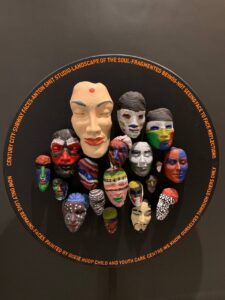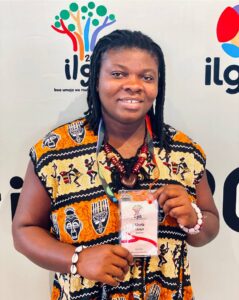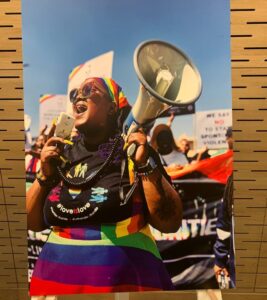In November 2024, I joined more than 1000 people from over 100 countries fighting for the liberation of LGBTIQ persons against discrimination and violence. At the 31st ILGA World Conference, I was honored to contribute to the strong flame of feminist discourse among African grassroots community leaders. As a grassroots activist organizing for and with marginalized Lesbian, Bisexual, and Queer women (LBQ Women), I carried with me so many stories, lessons, and strategies to share with and learn from others on how we can continue the struggle to end the oppression of women.
The struggle against patriarchy and imposed gender roles is central to my life and work. In the patriarchal world, you learn quickly the boundaries and limits put before you as a woman, even harder as a woman who is queer. My experience and those of friends and community members have not been pleasant but a struggle every day, yet we keep hopeful, knowing someday things will change for the better.
LBQ women were given very little attention as colonial laws sprung the lives of LGBTIQ+ persons into the control of society and the state.
Many explicitly sought to and still punish same-sex relationships regarding men, but the consequences go far beyond. LBQ women were often erased, even in the feminist movements on the continent. We see some improvement in how women marginalized due to their sexuality and gender expression are taking up space in feminist rooms to share their lived realities. The state of LBQ women in West African regions remains a difficult one despite our history showing that women’s relationships have been part of our societies, celebrated and recognized among, for instance, the Nzema and Akan ethnicities of Ghana.
Limited feminist spaces for LBQ women are a concern for me as often many spaces that even claim to be inclusive are not.
Internalized homophobia is also a factor. In some spaces, I have experienced debates on whether to make room for LBQ women’s voices to be heard. The fear of getting a backlash is often fronted as a reason to narrow and deny inclusivity beyond cis-heterosexual women and girls. So often, lesbian, bisexual, and queer women and girls face this erasure of their own experiences to participate in available spaces. In 2022, I was fortunate to join the 73rd Session of the African Commission on Human and People’s Rights in Banjul, The Gambia. There was a pre-session for activists engaging with the commission, and I was eager to know how the space was willing to support LBQ women. I raised concerns about the inclusion of LBQ women and there, and then, those points were taken up. Throughout my entire stay at the conference, I felt alone as the only LBQ woman and left out because I wasn’t given the space to speak and be heard.
Violence Against LBQ Women
 At ILGA, I attended one of the sessions on strengthening LBQ movements on the African continent. There’s still violence, discrimination, and stigma they continue to face from home, workplace, community, school, etc. LBQ youth shared their lived realities and challenges as young women who continue to face problems in navigating their identities, coming out, building peer relationships, and dealing with mental health issues. The space provided an avenue to find ways of overcoming these issues, especially in challenging negative stereotyping and substance abuse.
At ILGA, I attended one of the sessions on strengthening LBQ movements on the African continent. There’s still violence, discrimination, and stigma they continue to face from home, workplace, community, school, etc. LBQ youth shared their lived realities and challenges as young women who continue to face problems in navigating their identities, coming out, building peer relationships, and dealing with mental health issues. The space provided an avenue to find ways of overcoming these issues, especially in challenging negative stereotyping and substance abuse.
Violence against LBQ Women continues to rise through the experiences and recorded cases shared by LBQ activists in most African countries. In Ghana, for instance, we have the gender-based violence hotline, which operates nationally for community members. This hotline receives and documents violence incidents perpetrated against queer women. Queer adolescents also face unique challenges, which were highlighted in testimonies of how families, colleagues, churches, mosques, society, and community leaders often work together or reinforce each other in enacting violence. These stories resonated so much because of my own experience as a survivor of intimate partner violence and how it impacted my physical appearance and mental health. I had a lesbian partner and didn’t notice early on that what I was going on was an abusive relationship. It took a lot of safe spaces and education to understand intimate partner violence and for me to pick up my life.
Due to discrimination in society, often intimate partner violence faced by LBQ women is not documented and addressed as most societies deny the existence of these relationships to begin with. But we know that often patriarchal reenacted violence affects most relationships. This violence is rampant yet still challenging to address because it emanates from individuals within a minority group who continue to face further intolerance, criminalization, and discrimination. Understanding that these women also need protection gets challenging as victims often go for settling outside the law.
Forced Marriages
Forced marriage remains a big challenge for LBQ women because of the strong influence of religion and culture. Many women end up in more confined situations, leaving them with no option but to conform, run away, or fight until they are either free or have no more strength to challenge these religious and cultural norms.
A Nigerian activist shared about her work with LBQ women forced into marriages with men. and that abuse and disrespect by their husbands continue unchallenged. Many of their challenges included isolation, shattered dreams, inability to make choices over their lives, and being subjected to being stay-at-home wives with no income. We heard that forced marriage was an experience across various levels and that education often may not even protect many from forced unions.
It is difficult to support LBQ women in forced marriages as their experiences remain private for fear of reprisal from their families. Most LBQ women who would have escaped the traps of forced marriages often are unable to because how society has made it a mandate to meet the expectations of your family, which is usually measured by getting married and having children. I am often reminded of my biological father, who constantly reminds me that I am getting old and should have a child even if I am only in my twenties. Participants shared the need to advocate visibly against forced marriages of LBQ women as part of the rights of women and that their children are protected.
Reproductive Justice
We watched a documentary on Stop The War on Women’s Bodies, followed by a conversation. The documentary complemented experiences already shared on how our cultural and religious settings often reduce women’s bodies to sex and babymaking as men continue to demand the bodies of these women through marriage, societal expectations, and force. In the documentary, a highlight was given to LBQ women living in Southern Africa fighting against the oppression they face. South Africa is known to have one of the highest rates of gender-based violence and oppression against women and girls.
Access to healthcare service providers, geographical locations, regressive cultural and religious values, and lack of education on women’s health and empowerment programs continue to be the barriers preventing many women from making informed right decisions about their bodies and their lives.
Power in Movement Building
Our movement-building work in Africa has been a massive challenge. For instance, in Ghana, we continue to face gatekeeping issues, bureaucracy, and sabotaging within our women’s and feminist spaces due to limited resources. At the continental level, the breakdown of the Coalition of African Lesbians (CAL), which focused on activism, feminism, and pan-Africanism, left a big vacuum for organizations that were members. The breakdown halted consistent collaborations between members and limited information sharing on what advances in the struggle occurred.
LBQ organizations from different African countries were encouraged to collaborate through subregional and national initiatives. LBQ women are forming a coalition to expand spaces and seek greater protection and support for women’s diverse experiences to advance participation in feminist spaces on the continent.
As a Black feminist who identifies as an LBQ woman, a youth, and an African who believes in liberating queer women among the sexual and gender minority communities, it was a great opportunity for me to be in a community with activists, scholars, funders, researchers, and policymakers advocating for LBQ women. There’s still a need for feminist analysis to address inclusion and fight for policies that promote equal pay, legal reform, equitable opportunities, and job security for the advancement of all women in society.
Following this year’s theme, KWA UMOJA, which means WE RISE in Swahili, it is necessary to rise together with marginalized women and advance the feminist fight to ensure equality, equity, and support for LBQ women.
 Gloria Quaye is a human rights defender and feminist working with sexual and gender minority women and girls. With a background in media production, research, and advocacy, Quaye volunteers for the African Queer Youth Initiative (AQYI) and leads a couple of local initiatives working with youth, women, and girls.
Gloria Quaye is a human rights defender and feminist working with sexual and gender minority women and girls. With a background in media production, research, and advocacy, Quaye volunteers for the African Queer Youth Initiative (AQYI) and leads a couple of local initiatives working with youth, women, and girls.
This piece is part of our African Feminist Takes from the 31st ILGA World Conference. Between 11 to 15 November 2024, the ILGA World Conference was hosted in Africa for the first time in 25 years in Cape Town, South Africa. The ILGA World Conference is the largest global gathering of LGBTIQA+ changemakers bringing together LGBTQIA+ human rights defenders and development experts, policy makers, international human rights mechanisms experts, researchers, journalists, funders, and allies worldwide.
The conference convened under the theme Kwa umoja we rise!, a mix of Swahili and English – “Kwa umoja” meaning “Together” or “In unity’’, came at a time when many African feminist and queer movements are dealing with ongoing anti-rights pushback. African LGBTQIA+ movements are actively advocating for social justice alongside other groups, yet they face specific, ongoing violence and discrimination, and they risk losing hard-won rights. More than most, they face an environment of scapegoating, making human rights efforts increasingly challenging. Despite these setbacks, there’s been some progress in some countries in recent years, underscoring the critical need for solidarity and collaboration across movements. In the face of violent opposition, building bridges and inclusive movements in the pursuit of justice and a better future for all is essential.
African Feminism – AF, with the support of the African Women’s Development Fund (AWDF), collaborated with African feminists to share their perspectives from the conference, stand in solidarity with and support queer liberation movements on the African continent. This collaboration is centered on amplifying voices and narratives through an intersectional lens, highlighting emerging issues and lived experiences, while enhancing resistance and feminist consciousness.
The African Women’s Development Fund (AWDF) stands at the heart of Africa’s feminist movement as a transformative feminist fund dedicated to resourcing, nurturing, and strengthening women’s rights initiatives and feminist movements across the continent. As an active partner and fierce champion for gender justice, AWDF supports organisations to build sustainable foundations while creating lasting, systemic change across Africa.

